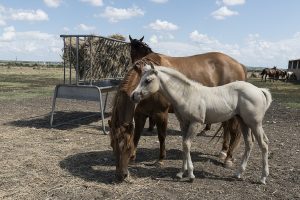University of Wisconsin – Madison Division of Extension
Releases Blister Beetle Fact Sheet
 To learn more about Equine toxicity and concerns due to blister beetles-what they are, where they are found, tips for hay producers and hay buyers, and what to do if you suspect toxicity, see the Equine and Blister Beetles Factsheet.
To learn more about Equine toxicity and concerns due to blister beetles-what they are, where they are found, tips for hay producers and hay buyers, and what to do if you suspect toxicity, see the Equine and Blister Beetles Factsheet.
Some important points to keep in mind:
- Poisoning by blister beetles is rare
- All hay can potentially contain blister beetles, but alfalfa hay has a greater risk
- Alfalfa blossoms can serve as a food source for adult blister beetles
- Blister beetles contain cantharidin, a burning agent or poison
- If equine and/or livestock animals display signs of toxicity, stop feeding your current hay source and contact your veterinarian immediately for diagnosis and treatment options
- Onset of toxicity symptoms can take a few hours to days
For information released by the University of Wisconsin – Madison, Wisconsin Veterinary Diagnostic Laboratory, please visit the following link: https://www.wvdl.wisc.edu/index.php/educating-your-equine-clients-about-feed-quality/.
Dr. Keith Poulsen, Director of Wisconsin Veterinary Diagnostic Laboratory, can be contacted at keith.poulsen@wvdl.wisc.edu or (608) 262 – 5422.
For more information, please contact your local Extension Educator; local veterinarian; forage testing facilities; PJ Liesch, Director of University of Wisconsin – Madison’s Insect Diagnostic Lab, at pliesch@wisc.edu or (608) 262 – 6510; or Dr. Darlene Konkle, Wisconsin State Veterinarian, at darlene.konkle@wisconsin.gov or (608) 224 – 4884.




